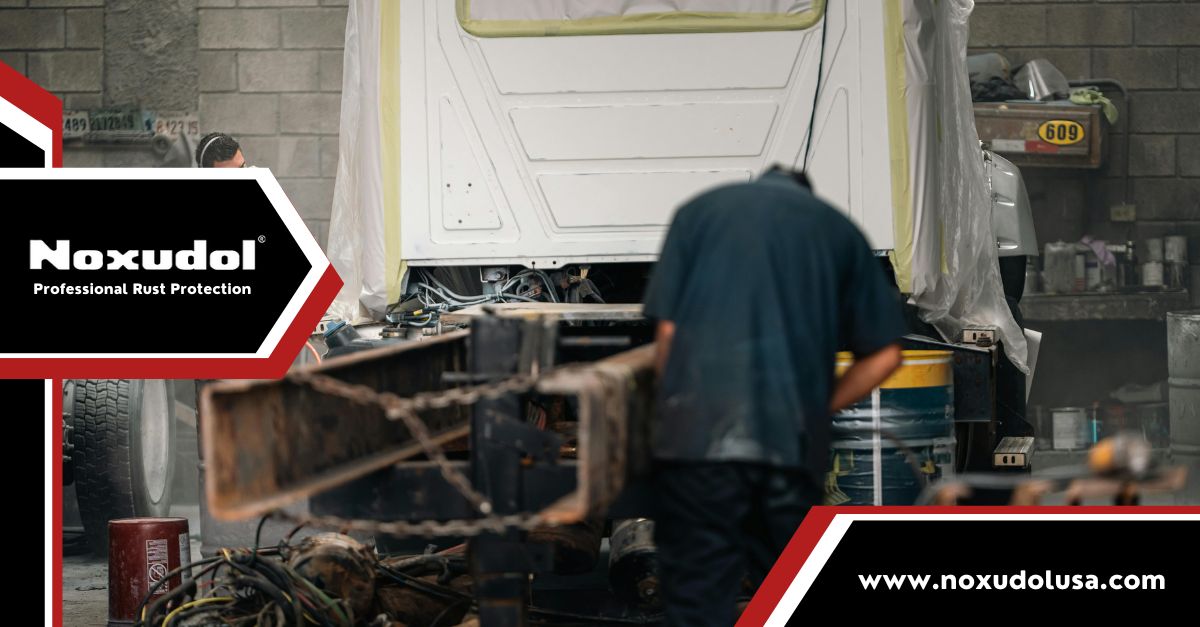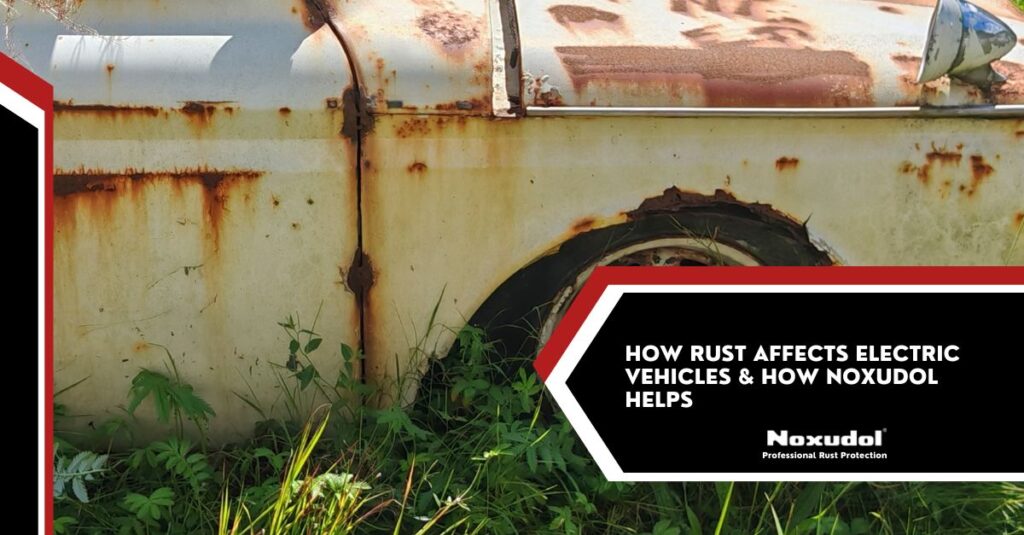Electric vehicles represent the future of transportation, but they’re not immune to one of the automotive industry’s oldest enemies: Electric vehicle rust and corrosion. While EVs don’t have traditional exhaust systems or fuel tanks to worry about, they face unique corrosion challenges that can impact performance, safety, and longevity.

Understanding how rust affects your electric vehicle—and taking proactive steps to protect it—can save you thousands in repairs while ensuring optimal performance for years to come. This comprehensive guide explores the specific ways corrosion impacts EVs and introduces proven solutions to keep your investment protected.
Why Electric Vehicle Rust Creates Unique Challenges
Electric vehicles contain sophisticated electronic components, high-voltage battery systems, and specialized materials that create distinct vulnerabilities to corrosion. Unlike traditional combustion engines, EVs rely heavily on electrical connections and sensitive components that can fail catastrophically when exposed to moisture and corrosive elements.
The undercarriage of an EV houses critical components including battery packs, cooling systems, charging ports, and hundreds of electrical connections. These components operate in harsh conditions, exposed to road salt, moisture, debris, and temperature fluctuations that accelerate Electric vehicle rust processes.
Battery Enclosure Vulnerability
The battery pack represents the most expensive component in any electric vehicle. Corrosion around battery enclosures can compromise sealing systems, allowing moisture to penetrate protective barriers. This not only threatens the cells but also damages thermal management systems. Electric vehicle rust in these enclosures can create long-term performance and safety issues.
Corrosion around battery enclosures can compromise sealing systems, allowing moisture to penetrate protective barriers. This not only threatens the battery cells themselves but can also damage the sophisticated thermal management systems that keep batteries operating within safe temperature ranges.
Critical Areas Where Electric Vehicle Rust Impacts Performance
Electrical Connections and Wiring Harnesses
Electric vehicles contain extensive wiring networks carrying high-voltage current throughout the vehicle. Corroded connections create resistance, leading to voltage drops, reduced efficiency, and potential safety hazards. Even minor corrosion on electrical terminals can cause intermittent failures that are difficult to diagnose and expensive to repair.
Cable connections exposed to road spray and environmental moisture are particularly vulnerable. Corrosion can cause arcing, overheating, and complete system failures that leave vehicles inoperable.
Cooling System Components
EV batteries and motors generate significant heat that must be managed through sophisticated cooling systems. These systems often use aluminum radiators, coolant lines, and heat exchangers that can suffer from both internal and external corrosion.
External corrosion attacks cooling system components from road exposure, while internal corrosion can occur when coolant chemistry becomes imbalanced. Either scenario can lead to cooling system failures that put expensive drivetrain components at risk.
Charging Infrastructure
Charging ports and associated hardware face constant exposure to environmental conditions. Corroded charging connections can create dangerous arcing conditions, reduce charging efficiency, or prevent charging altogether. The high currents involved in DC fast charging make clean, corrosion-free connections essential for both safety and performance.
Structural Components
Like traditional vehicles, EVs rely on structural integrity for safety and performance. However, the additional weight of battery systems places extra stress on chassis components, making structural corrosion particularly concerning. Compromised structural elements can affect crash safety, handling characteristics, and component mounting points.
How Corrosion Affects EV Safety and Performance
Rust and corrosion impact electric vehicles in ways that extend beyond simple aesthetic concerns. Performance degradation often occurs gradually, making problems difficult to detect until significant damage has occurred.
Reduced Range and Efficiency
Corroded electrical connections create resistance that forces the vehicle’s systems to work harder, reducing overall efficiency. A 10% increase in electrical resistance can translate to measurably reduced driving range, particularly noticeable during highway driving or extreme weather conditions.
Safety System Compromises
Modern EVs integrate numerous safety systems that rely on clean electrical connections and properly functioning sensors. Corrosion can cause false readings, system malfunctions, or complete safety system failures that put occupants at risk.
Thermal Management Issues
Battery thermal management systems must operate flawlessly to prevent overheating, which can lead to battery degradation, reduced performance, or in extreme cases, thermal runaway events. Corroded cooling system components compromise this critical safety function.
Car Rust Protection: Advanced Solutions for EVs
Protecting EVs from corrosion requires specialized approaches that account for unique design and materials. Traditional undercoating may not protect sensitive electronics. Instead, advanced coatings like Noxudol ensure effective Electric vehicle rust prevention across all vulnerable areas.
Material Compatibility Considerations
Electric vehicles use diverse materials including high-strength steels, aluminum alloys, composites, and specialized plastics. Effective car rust protection must be compatible with all these materials while providing long-term protection without interfering with electrical systems or thermal management.
The challenge lies in finding protective coatings that maintain their effectiveness across temperature ranges from -40°F to 200°F, resist chemical attack from road salt and automotive fluids, and remain flexible enough to accommodate thermal expansion and vibration.
Noxudol: Proven Protection for Electric Vehicles
For more than 20 years, Soken Trade Corporation’s professional staff and management team has been serving customers worldwide, bringing advanced rust protection solutions to the automotive industry. Noxudol represents the most advanced and reliable line of car rust protection products, developed through close collaboration with experienced professionals and manufacturers.
Advanced Formulation Technology
Noxudol products utilize cutting-edge chemistry specifically engineered for modern automotive applications. The formulations provide superior adhesion to diverse substrate materials while maintaining flexibility across extreme temperature ranges.
Unlike traditional petroleum-based undercoatings, Noxudol products are designed to penetrate deeply into substrate surfaces, creating molecular bonds that resist separation even under severe mechanical stress. This deep penetration ensures long-term protection that won’t chip, crack, or peel away from critical components.
EV-Specific Benefits
Noxudol’s compatibility with EV materials makes it an ideal choice for electric vehicle protection. The products maintain their protective properties without affecting electrical conductivity in designated areas, ensuring that grounding connections and shielding systems continue to function properly.
The formulation resists the wide temperature ranges experienced in EV applications, from the heat generated by fast-charging systems to the cold temperatures that can affect battery performance. This thermal stability ensures consistent protection regardless of operating conditions.
Professional Application Advantages
Proper application of car rust protection requires expertise and specialized equipment. Professional application ensures complete coverage of critical areas while avoiding sensitive components that shouldn’t be coated.
Soken Trade Corporation works with customers to develop comprehensive portfolios of products intended for specific needs and requirements. This consultative approach ensures that each vehicle receives optimal protection based on its intended use, environmental exposure, and design characteristics.
Comprehensive Protection Strategies
Effective EV rust protection requires a systematic approach that addresses all vulnerable areas and components. This includes battery enclosures, electrical connections, cooling system components, charging infrastructure, and structural elements.
Preventive Maintenance Integration
Regular inspection and maintenance of protective coatings ensures long-term effectiveness. Professional application includes detailed documentation of protected areas and recommended inspection intervals to maintain optimal protection levels.
Environmental factors such as coastal exposure, road salt usage, and industrial pollution affect the rate of coating degradation. Customized maintenance schedules account for these variables to ensure continuous protection.
Investment Protection for EV Owners
Electric vehicles represent significant investments that deserve comprehensive protection. The cost of professional rust protection is minimal compared to the potential expense of corroded components, especially when considering the high value of EV-specific parts like battery systems and drive units.
Proactive protection also maintains vehicle value for resale or lease return. Vehicles with documented protection history and well-maintained undercarriage components command higher market values and avoid costly end-of-lease penalties.
Securing Your Electric Vehicle’s Future
Electric vehicle ownership brings unique responsibilities, including protection against corrosion that can compromise performance, safety, and value. Understanding these vulnerabilities and taking proactive steps to address them ensures that your investment delivers reliable service for years to come.
Noxudol’s advanced car rust protection technology, backed by Soken Trade Corporation’s two decades of expertise, provides the comprehensive protection that modern electric vehicles require. Professional application and ongoing maintenance create a protective barrier that preserves both performance and value.
Don’t wait for corrosion problems to develop. Contact Soken Trade Corporation today to discuss a customized protection program for your electric vehicle. Our experienced team will develop a comprehensive solution tailored to your specific requirements and operating conditions.


